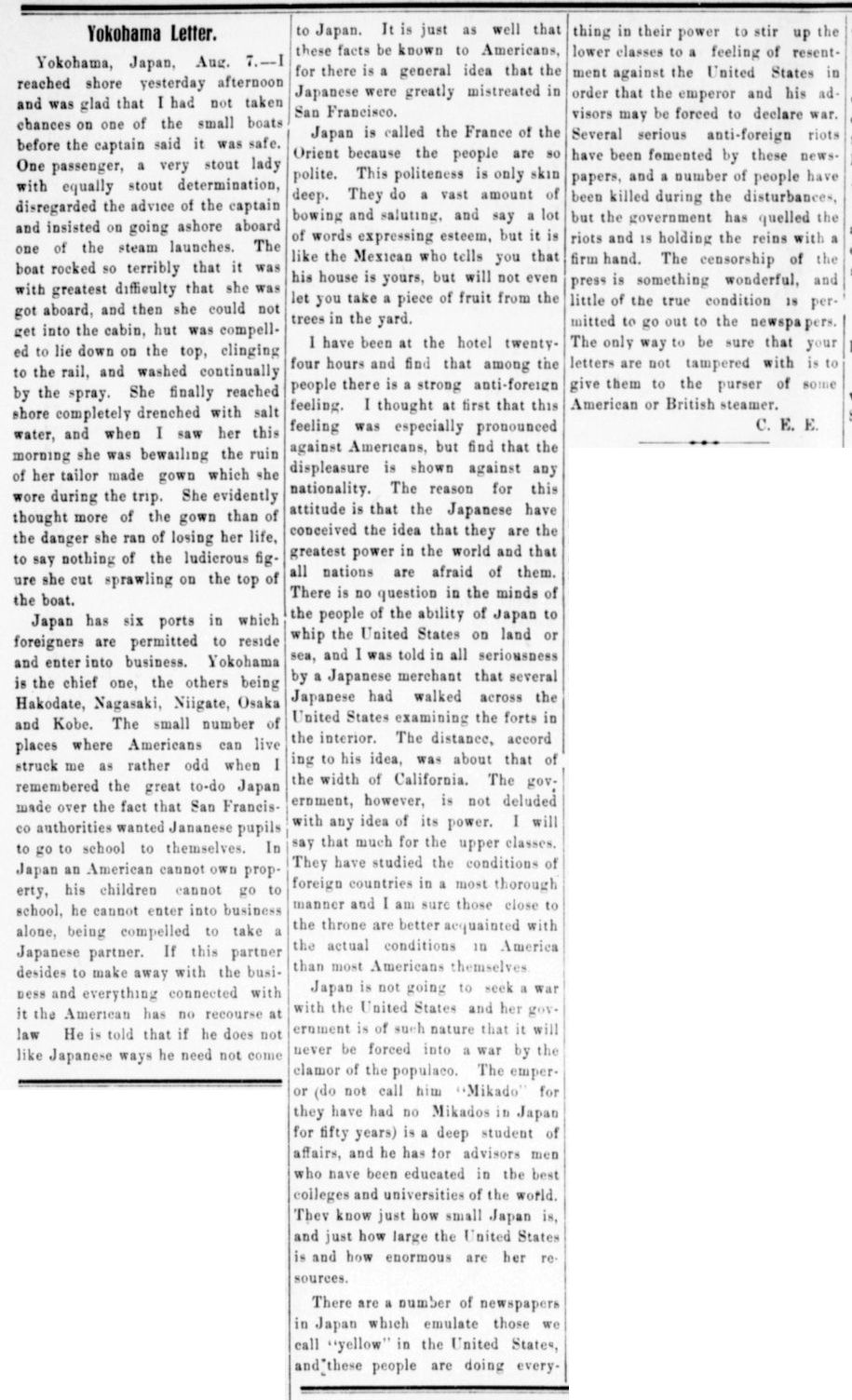August 7, 1907
Yokohama Letter.
Yokohama, Japan, Aug. 7.--
I reached shore yesterday afternoon and was glad that I had not taken chances on one of the small boats before the captain said it was safe. One passenger, a very stout lady with equally stout determination, disregarded the advice of the captain and insisted on going ashore aboard one of the steam launches. The boat rocked so terribly that it was with greatest difficulty that she was got aboard, and then she could not get into the cabin, but was compelled to lie down on the top, clinging to the rail, and washed continually by the spray. She finally reached shore completely drenched with salt water, and when I saw her this morning she was bewailing the ruin of her tailor made gown which she wore during the trip. She evidently thought more of the gown than of the danger she ran of losing her life, to say nothing of the ludicrous figure she cut sprawling on the top of the boat.
Japan has six ports in which foreigners are permitted to reside and enter into business. Yokohama is the chief one, the others being Hakodate, Nagasaki, Niigate, Osaka and Kobe. The small number of places where Americans can live struck me as rather odd when I remembered the great to-do Japan made over the fact that San Francisco authorities wanted Japanese pupils to go to school to themselves. In Japan an American cannot own property, his children cannot go to school, he cannot enter into business alone, being compelled to take a Japanese partner. If this partner desides to make away with the business and everything connected with it the American has no recourse at law. He is told that if he does not like Japanese ways ne need not come to Japan. It is just as well that these facts be known to Americans, for there is a general idea that the Japanese were greatly mistreated in San Francisco.
Japan is called the France of the Orient because the people are so polite. This politeness is only skin deep. They do a vast amount of bowing and saluting, and say a lot of words expressing esteem, but it is like the Mexican who tells you that his house is yours, but will not even let you take a piece of fruit from the trees in the yard.
I have been at the hotel twenty-four hours and find that among the people there is a strong anti-foreign feeling. I thought at first that this feeling was especially pronounced against Americans, but find that the displeasure is shown against any nationality. The reason for this attitude is that the Japanese have conceived the idea that they are the greatest power in the world and that all nations are afraid of them. There is no question in the minds of the people of the ability of Japan to whip the United States on land or sea, and I was told in all seriousness by a Japanese merchant that several Japanese had walked across the United States examining the forts in the interior. The distance, according to his idea, was about that of the width of California. The government, however, is not deluded with any idea of its power. I will say that much for the upper classes. They have studied the conditions of foreigh countries in a most thorough manner and I am sure those close to the throne are better acquainted with the actual conditions in America than most Americans themselves.
Japan is not going to seek a war with the United States and her government is of such nature that it will never be forced into a war by the clamor of the populace. The emperor (do not call him "Mikado" for thay have had no Mikados in Japan for fifty years) is a deep student of affairs, and he has for advisors men who have been educated in the best colleges and universities of the world. They know just how small Japan is, and just how large the United States is and how enormous are her resources.
There are a number of newspapers in Japan which emulate those we call "yellow" in the United States, and these people are doing everything in their power to stir up the lower classes to a feeling of resentment against the United States in order that the emperor and his advisors may be forced to declare war. Several serious anti-foreign riots have been fomented by these newspapers, and a number of people have been killed during the disturbances, but the government has quelled the riots and is holding the reins with a firm hand. The censorship of the press is something wonderful, and little of the true condition is permitted to go out to the newspapers. The only way to be sure that your letters are not tampered with is to give them to the purser of some American or British steamer.
C. E. E.
Source: Crittenden Record-Press. (Marion, Ky.) 1907-1918, December 19, 1907, Image 2 - Chronicling America - The Library of Congress.
[My comments are in brackets.]
